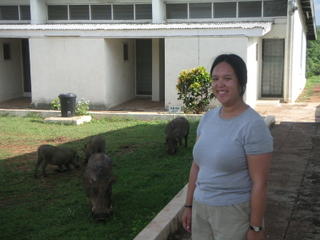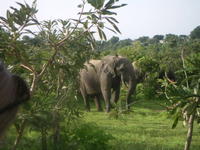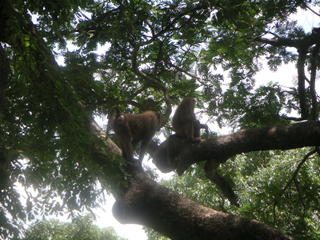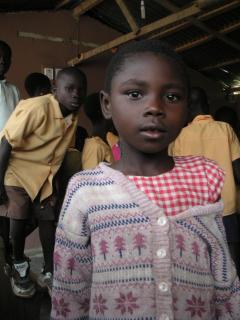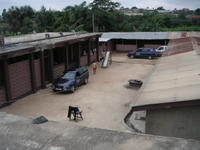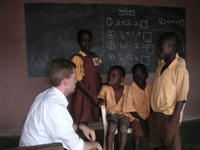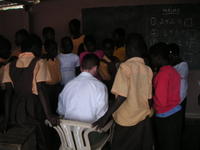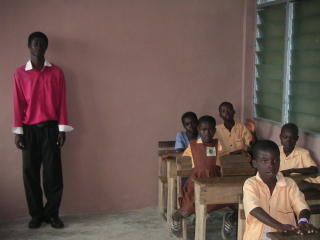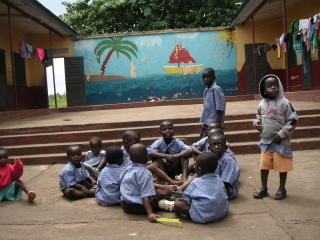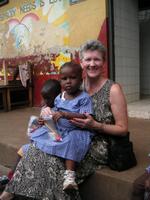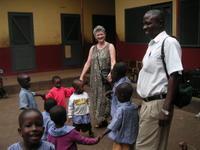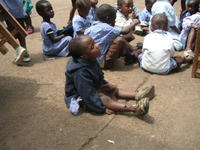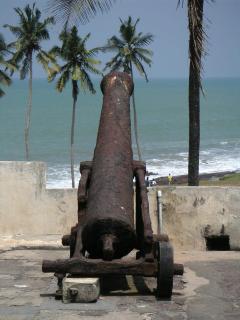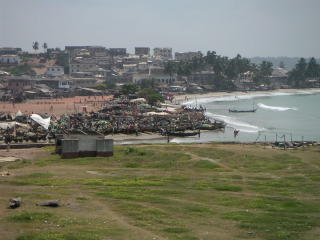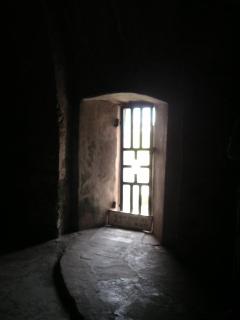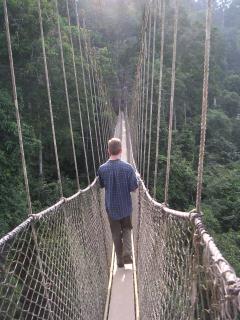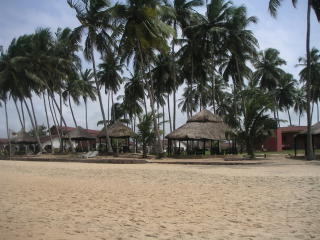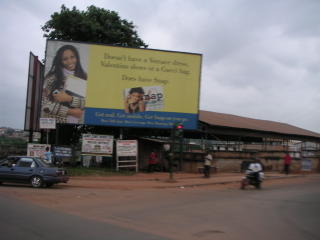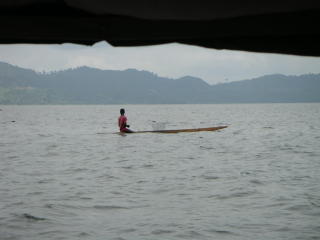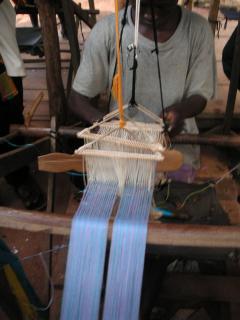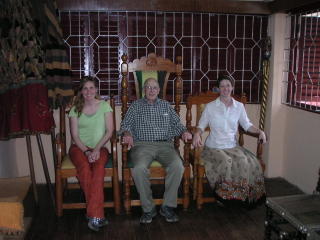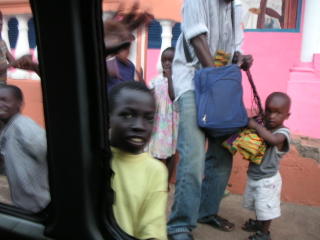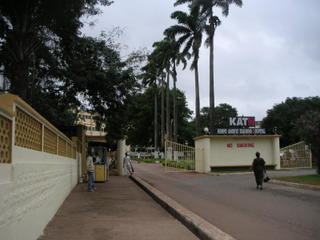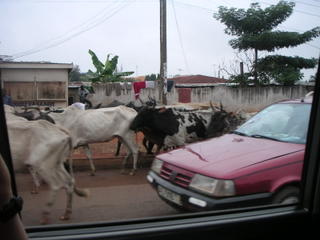John always beats me to the punch and writes entries about the amazing places we've been to together. So, I guess I'll treat this blog as I do with pictures from our trips with Doug-- beautiful landscape portraits are taken by others, and I'll supplement with point and shoot snippets of people.
If I were to write a book about Ghana, I'd like to include the following people we've met here in my story. Like Anne (the mother who is also staying at the guesthouse) these are just passing acquaintances but I found them to be fascinating. Hope you do too.
Marba- Marba is an orphan at the King Jesus Charity Home. As John described, we were swarmed by orphans as soon as we stepped out of the truck. Things settled down eventually, as Pastor Kofi led us on a tour and sent the kids back to class. The children were divided between four classrooms, grades 1 through 6, and although the kids were more interested in what we were doing, they dutifully sat at their desks, with one ear cocked to their teachers and the corners of their eyes following us instead. It was while listening in on the grade 3 glass that Marba approached us. She was singing to herself and pulling at her clothes. She instantly came up to me and hugged me, then put her arm around my waist and curled against my shoulder. Pastor Kofi said that she has a "mental illness" but it appears to be more severe mental retardation. Pastor Kofi said that she cannot go to school and can't do chores, so she does nothing all day. She recognizes her name and readily repeats it (if you say it right). When I asked Pastor Kofi if anything could be done for her (and explained how in the US we try to find meaningful activities for people with disabilities), he said that there is a government run school that could try to teach her but he has no money to send her. For now, she wanders by herself through the yard, softly mumbling to herself as the other children do their studies. I hope there really is a school to send her to, and not just the home that I read about where they seem to isolate children with mental/cognitive disabilities.
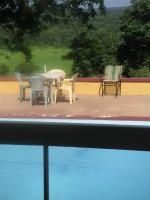 The Kids from Damango Secondary School-
The Kids from Damango Secondary School- When we came back from our morning walking safari at Mole National Park, we found a crowd of local teenagers crowded around the hotel's pool. They were taking pictures and talking excitedly about it, hoping that they could find the money to pay for the non-guest fee for swimming at the pool. Soon, a boy saw our table and asked if he could take a picture with us. This triggered a string of requests from others, each taking turns sitting at our table. We happily complied, even if we did feel like characters in costume at Disney World. Some stayed at our table to chat. One young lady bobbed and swayed rhythmically while she talked, as if constantly grooving to some music that played in her head. She explained that they were all from nearby Damango Secondary School and that this was a weekend excursion of their Wildlife Club. They had been out on the morning walk as well, and you could hear their excited chatter about the elephants near the hotel. However, I think they were more fascinated with a different wildlife site-- the rarely seen (in Ghana at least), fat, old German man in a speedo as he performed his ritualistic wading in the pool. Rather than repulsing them, the kids crowded around this site and it seemed to increase their fervor to jump in!
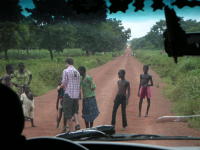 Andy-
Andy- Andy is a young man from Aberdeen, Scotland studying politics and has been working an internship with a Ghanain newspaper this summer. We met Andy at Mole and when we found out that he needed a ride back to Kumasi, we sold him a seat in our overly spacious, air conditioned van. Andy has been writing about the coal mining trade in Ghana, how it's somewhat exploitative of its workers, and (surprise surprise!) funded by American investors. In his short 5 weeks here, Andy's come down with malaria and been in a horrible tro tro accident (the main source of public transportation here) when the drunken driver sped down a dirt road at night and veered off the road. Consequently, Andy was our protector when our van driver was driving a bit too fast for our comfort. Andy sat up in the front seat, showed him the picture he'd taken of his tro tro accident, and coached him on the proper speed to take on the dirt roads leading us out of the monkey sanctuary. Hopefully, we'll see him again when we get back to Accra on Wednesday.
Philip and Gladys- Finally, there's Philip and Gladys, cousins that we met while walking home from the internet cafe last Thursday. Philip introduced himself to us first. He's twelve years old and lives at the guesthouse next door to ours. His cousin Gladys's father runs the guest house. Philip lives there with him so he can go to school at the university's junior secondary school-- his mother lives 153 km away in a small town. Philip sees her when he takes the bus home on weekends. Philip made me think of my own parents, particularly my mother, who left her parents at a fairly young age to go to school in the states. Philip is such a bright young man, and we had fun asking him questions and answering his, particularly when he asked us if it's true what he heard: that to go from Salt Lake City to Philadelphia, one has to take a plane! This question humbled us a bit as John realized that the closest distance analogy he could think of would be to go from Ghana to Kenya or to the Sudan.
Most recent local food: When John ate kenkeye, I ate boiled cassava and plantains in palova sauce. The sauce was a bit fishy, and it was not my favorite, but it was pretty tastey. Mostly filling. I only was able to eat about two pieces of plantain and one chunk of cassava before being totally full. Our waiter was very hurt, assuming that I and the others at our table didn't like our food, but he perked up and gave us a lesson in local ingredients, including yam leaves (the leafy green that we think was in the Black Star dish) and the small pepe pepper that gives some heat to most Ghanain dishes.
Best Non-religous local business name: Marvin Gaye Spot and Communication Center





